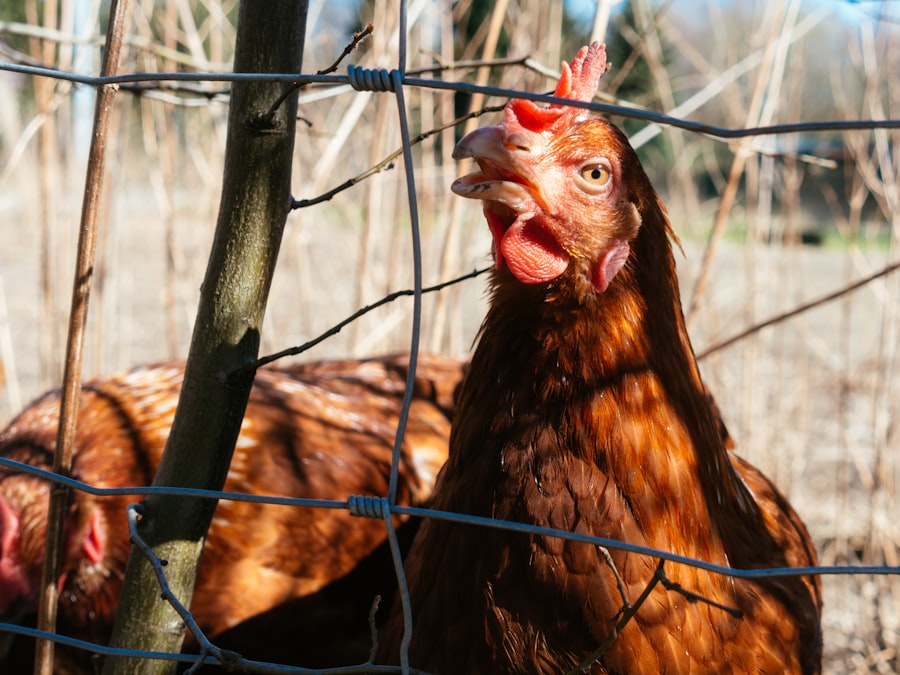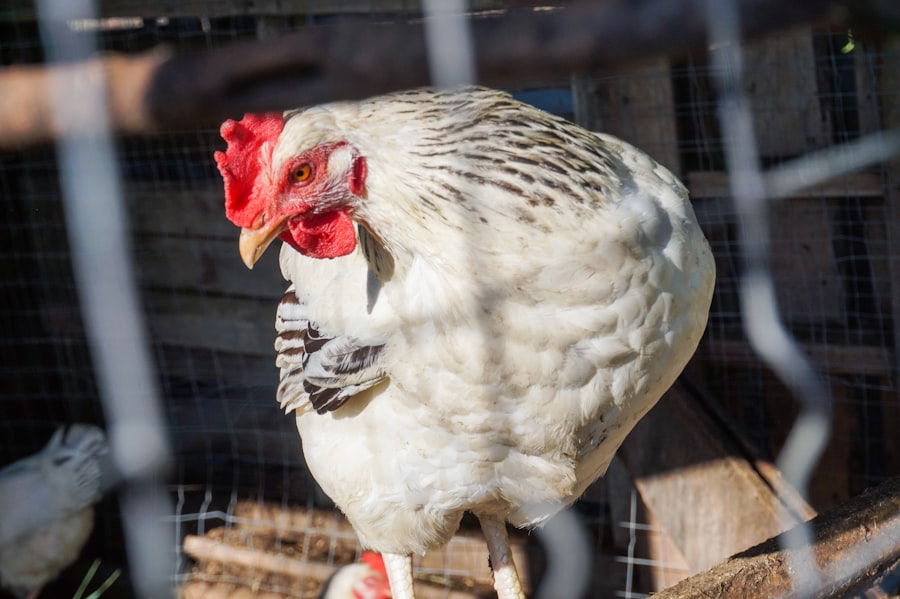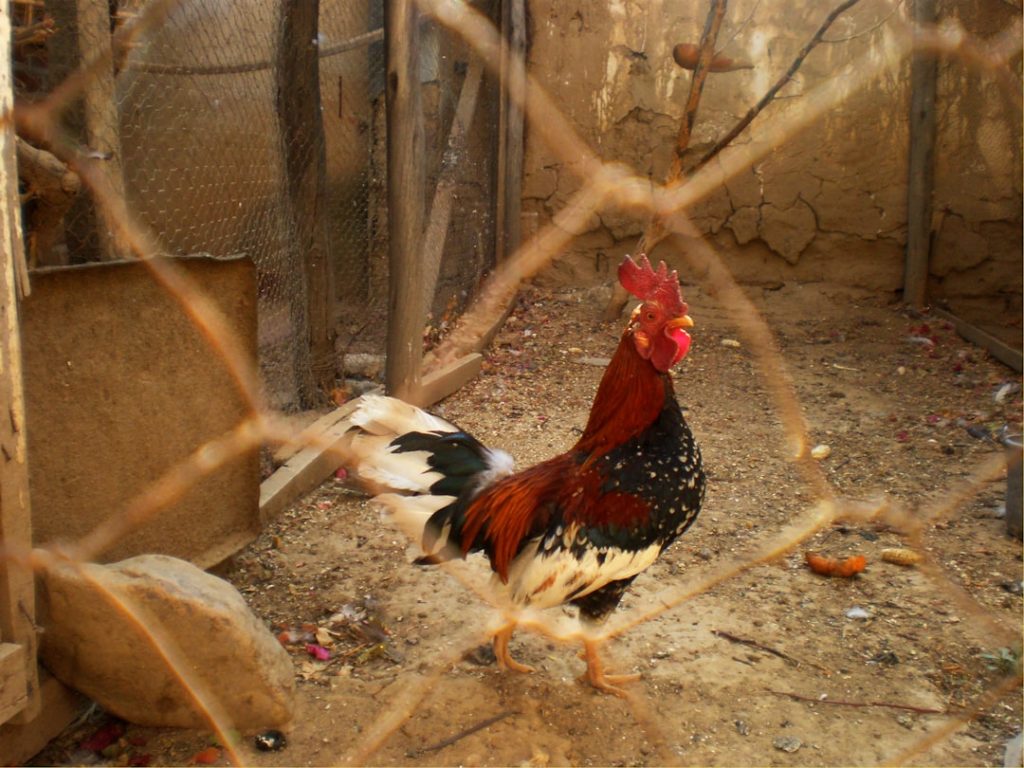Chickens can cause various problems in gardens due to their natural behaviors and instincts. Their scratching and pecking habits can damage plants, flowers, and vegetables, potentially destroying carefully cultivated garden beds. Chickens are often attracted to specific crops like lettuce, strawberries, and tomatoes, which can result in significant produce loss for gardeners.
Chicken droppings in the garden pose hygiene concerns and can lead to soil nutrient imbalances, affecting overall garden health and productivity. Chickens also engage in dust bathing, which can disrupt soil and harm delicate plants. They tend to disturb mulch and compost piles, interfering with the natural decomposition process of organic matter.
Freshly turned soil attracts chickens, potentially damaging newly planted seeds and seedlings. Their scratching and pecking can uproot young plants and disrupt soil structure, hindering the establishment of strong root systems. Chickens may also cause damage to garden structures like trellises and fences while attempting to access nearby plants.
These behaviors can lead to frustration and disappointment for gardeners trying to maintain a healthy and productive outdoor space. The presence of chickens in gardens often results in a conflict between the birds’ natural instincts and the gardeners’ efforts to cultivate and protect their plants.
Table of Contents
- 1 Ways to physically keep chickens out of the garden
- 2 Using natural deterrents to keep chickens away from the garden
- 3 Creating designated areas for chickens to roam
- 4 Training chickens to stay out of the garden
- 5 Communicating with neighbors about their chickens
- 6 Legal considerations for keeping chickens out of the garden
- 7 FAQs
Key Takeaways
- Chickens can be a nuisance in the garden by scratching up plants, eating fruits and vegetables, and leaving droppings.
- Ways to physically keep chickens out of the garden include installing fences, using chicken wire, and creating barriers with rocks or other materials.
- Natural deterrents such as citrus peels, coffee grounds, and predator decoys can help keep chickens away from the garden.
- Creating designated areas for chickens to roam, such as a chicken run or free-range area, can help minimize their impact on the garden.
- Training chickens to stay out of the garden can be done through positive reinforcement, such as providing treats in their designated area.
- Communicating with neighbors about their chickens and finding mutually beneficial solutions can help address any issues related to chickens in the garden.
- Legal considerations for keeping chickens out of the garden may include local ordinances, zoning regulations, and property boundaries that need to be respected.
Ways to physically keep chickens out of the garden
Fencing the Garden
One effective approach to keeping chickens out of the garden is to install a sturdy fence around the perimeter. The fence should be at least 6 feet tall and buried several inches into the ground to prevent chickens from digging underneath it. The fence material should also be chosen carefully to ensure that chickens cannot easily climb or fly over it, such as wire mesh or poultry netting.
Using Barriers and Enclosures
Another physical barrier that can be used to keep chickens out of the garden is a chicken wire cloche or cage. These structures can be placed over individual plants or garden beds to protect them from chicken damage. They are particularly useful for safeguarding delicate seedlings and young plants from being disturbed by scratching and pecking. Additionally, physical barriers such as chicken wire or hardware cloth can be used to create temporary enclosures or barriers around specific areas of the garden that need protection.
Motion-Activated Deterrents
Motion-activated deterrents such as sprinklers or noise devices can also be used to keep chickens out of the garden. These devices are designed to startle and deter chickens when they approach the garden area. The sudden burst of water or loud noise can help to discourage chickens from entering the garden without causing them any harm.
Using natural deterrents to keep chickens away from the garden

In addition to physical barriers, natural deterrents can also be used to keep chickens away from the garden. One effective natural deterrent is the use of strong-smelling herbs and plants that chickens find unappealing. For example, planting aromatic herbs such as lavender, rosemary, and mint around the perimeter of the garden can help to deter chickens from entering the area.
These plants emit strong scents that are unpleasant to chickens and can help to keep them at a distance. Additionally, spreading citrus peels or coffee grounds around the garden can also act as a natural deterrent, as chickens tend to dislike the smell of these materials. Another natural deterrent that can be used to keep chickens away from the garden is the use of predator decoys.
Placing decoys such as fake owls or hawks in and around the garden can create the illusion of a predator presence, which may deter chickens from entering the area. Additionally, allowing natural predators such as cats or dogs to roam freely in the garden can help to keep chickens at bay. The presence of these animals can create a sense of danger for chickens, making them less likely to venture into the garden.
Creating designated areas for chickens to roam
One effective way to prevent chickens from becoming a nuisance in the garden is to create designated areas for them to roam. By providing chickens with their own space to scratch, peck, and forage, they are less likely to venture into the garden in search of food and entertainment. One option is to create a chicken run or enclosure that is separate from the main garden area.
This enclosed space should be large enough to allow chickens to move around freely and engage in natural behaviors such as dust bathing and foraging. Additionally, providing enrichment items such as perches, logs, and hanging treats can help to keep chickens entertained and content within their designated area. Another option for creating designated areas for chickens is to implement rotational grazing practices.
This involves dividing the outdoor space into several smaller sections and rotating the chickens between them on a regular basis. This allows each section of land to recover and regrow while giving chickens access to fresh forage and vegetation. By rotating their grazing areas, chickens are less likely to become bored or restless, reducing the likelihood of them seeking out alternative sources of entertainment in the garden.
Training chickens to stay out of the garden
Training chickens to stay out of the garden can be a challenging but ultimately effective way to prevent them from becoming a nuisance. One method for training chickens is through positive reinforcement. By rewarding desirable behaviors such as staying within designated areas or avoiding certain parts of the garden, chickens can learn to associate these behaviors with positive outcomes.
For example, providing treats or access to fresh forage when chickens remain within their designated space can help to reinforce this behavior. Another training method is through the use of deterrents such as noise or visual cues. For example, using a whistle or clapping hands when chickens approach the garden can help to startle them and discourage them from entering the area.
Additionally, hanging shiny objects or reflective tape around the perimeter of the garden can create visual deterrents that may dissuade chickens from approaching.
Communicating with neighbors about their chickens

Approaching the Conversation
If you find that your neighbor’s chickens are causing issues in your garden, it’s essential to approach the situation with diplomacy and open communication. Start by having a friendly conversation with your neighbor about your concerns regarding their chickens’ behavior in your garden. Be sure to approach the conversation with a positive attitude and a willingness to work together towards a solution.
Clearly Communicating Concerns
During your conversation with your neighbor, it’s crucial to clearly communicate how their chickens are impacting your garden and why it’s a concern for you. Be specific about the damage caused by their chickens and how it is affecting your ability to maintain your garden space. It’s also important to listen to your neighbor’s perspective and be open to finding a compromise that works for both parties.
Resolving the Issue
If necessary, you may need to involve local authorities or mediation services to help resolve the issue if your neighbor is unwilling to address your concerns. However, approaching your neighbor with an open mind and a willingness to find a mutually beneficial solution is often the best first step in addressing issues related to their chickens impacting your garden.
Legal considerations for keeping chickens out of the garden
When dealing with issues related to neighbors’ chickens impacting your garden, it’s important to be aware of any legal considerations that may apply in your area. Familiarize yourself with local ordinances and regulations regarding keeping poultry within residential areas. Some municipalities have specific rules regarding where chickens are allowed to roam and how they should be contained on private property.
If you find that your neighbor’s chickens are in violation of local regulations, you may need to involve local authorities or animal control services to address the issue. Be sure to document any instances of damage caused by their chickens and any attempts you’ve made to resolve the situation with your neighbor. It’s also important to consider any potential legal implications if you take matters into your own hands by attempting to physically keep your neighbor’s chickens out of your garden.
Trespassing laws may apply if you take action on your neighbor’s property without their permission, so it’s important to approach the situation with caution and seek legal advice if necessary. In conclusion, dealing with nuisance chickens in the garden requires a combination of physical barriers, natural deterrents, designated areas for chickens, training methods, open communication with neighbors, and awareness of legal considerations. By employing these strategies and approaching the situation with diplomacy and open-mindedness, it is possible to mitigate the impact of chickens on your garden while maintaining positive relationships with neighbors.
If you’re looking for tips on how to keep chickens out of your garden, you might find this article on where to put a chicken coop helpful. It offers advice on the best location for your coop to minimize the impact on your garden.
FAQs
How can I keep chickens out of my garden?
To keep chickens out of your garden, you can use physical barriers such as fences or chicken wire to prevent them from entering the garden area. You can also use natural deterrents such as planting prickly or strong-smelling plants around the perimeter of the garden to discourage chickens from entering.
Are there any plants that can help keep chickens out of my garden?
Yes, there are certain plants that can help deter chickens from entering your garden. Plants with strong scents such as lavender, mint, or rosemary can help repel chickens. Additionally, plants with prickly leaves or thorns, such as holly bushes or barberry bushes, can also discourage chickens from entering the garden.
What are some other methods for keeping chickens out of the garden?
In addition to physical barriers and plant deterrents, you can also try using motion-activated sprinklers or noise-making devices to scare away chickens. Some gardeners also use natural predators such as dogs or cats to keep chickens out of the garden.
Are there any specific chicken breeds that are less likely to enter a garden?
Some chicken breeds are known to be less likely to wander into garden areas. Breeds such as Silkies, Cochins, or Polish chickens are generally more docile and less likely to cause damage to gardens. However, individual chicken behavior can vary, so it’s important to take preventative measures regardless of the breed.
Meet Walter, the feathered-friend fanatic of Florida! Nestled in the sunshine state, Walter struts through life with his feathered companions, clucking his way to happiness. With a coop that’s fancier than a five-star hotel, he’s the Don Juan of the chicken world. When he’s not teaching his hens to do the cha-cha, you’ll find him in a heated debate with his prized rooster, Sir Clucks-a-Lot. Walter’s poultry passion is no yolk; he’s the sunny-side-up guy you never knew you needed in your flock of friends!







